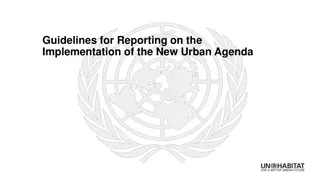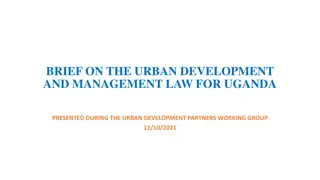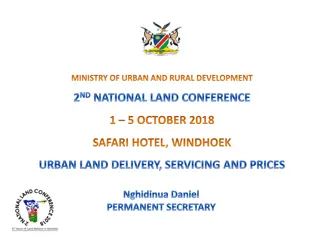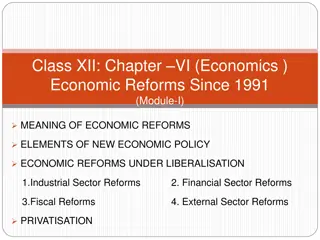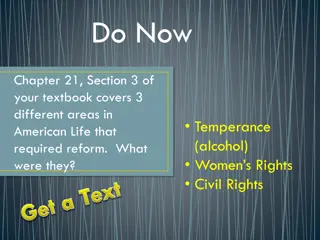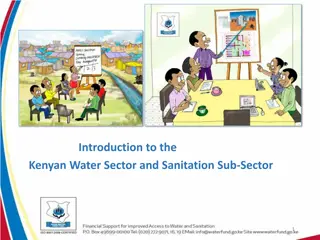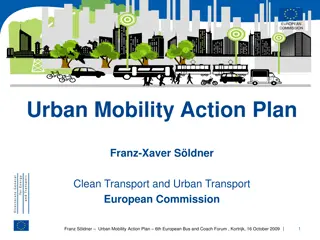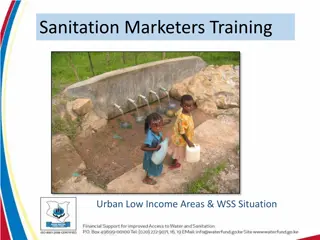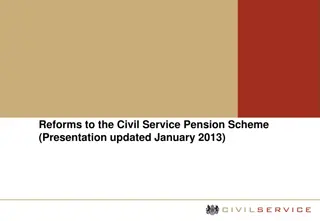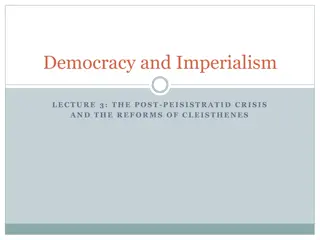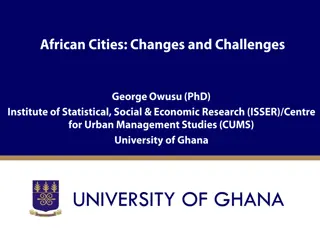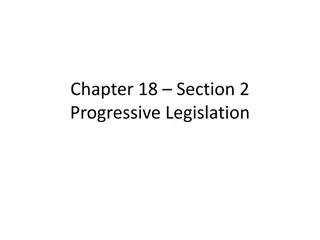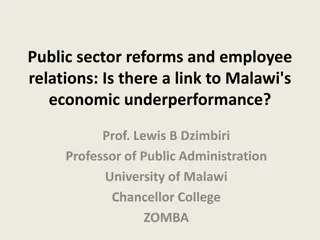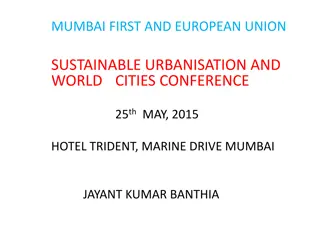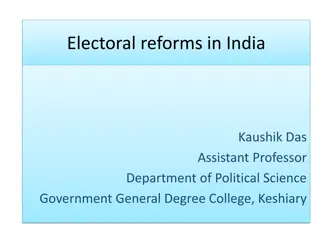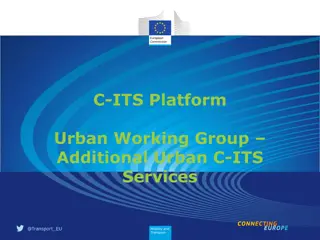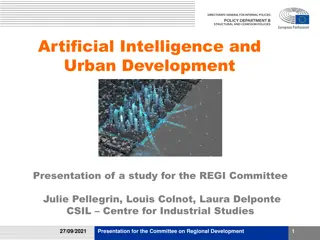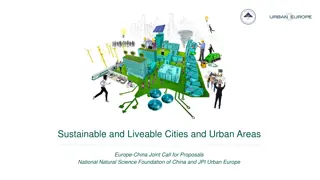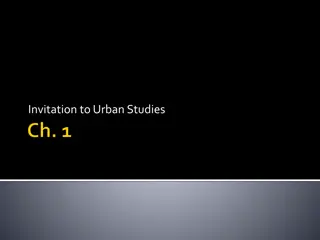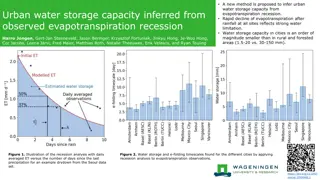Challenges and Opportunities for Reforms of Non-Oil Revenues Administration in South Sudan
The presentation highlights the reliance on oil revenues in South Sudan and the need for reforms in non-oil revenue administration. It discusses sources of non-oil revenue, factors hindering revenue mobilization, and opportunities for reforms to diversify the economy. The objectives of non-oil reven
3 views • 23 slides
Dallas Comprehensive Urban Agriculture Plan Summary
Dallas's Comprehensive Urban Agriculture Plan focuses on promoting urban agriculture to ensure all communities have access to healthy, local food. The plan includes strategies to reduce regulatory barriers, support land access, provide education and resources, facilitate partnerships, and build mark
6 views • 7 slides
Financial Sector Reforms in India: An Overview
In the early 1990s, India witnessed significant reforms in its financial sector, addressing issues like lack of transparency, extensive regulation, and financial repression. Key reforms included setting up expert committees, reducing SLR and CRR, implementing prudential norms, and deregulating inter
0 views • 18 slides
Guidelines for Reporting on the Implementation of the New Urban Agenda
The guidelines emphasize the importance of periodic follow-up and review of the New Urban Agenda by Member States to ensure effective implementation. They stress inclusivity, transparency, and voluntary participation in tracking progress towards sustainable urban development goals. The document outl
2 views • 11 slides
Overview of Uganda's Urban Development and Management Law
Vision 2040 and National Development Plan emphasize the pivotal role of cities in Uganda's development. The absence of a legal framework for urban development led to fragmented mandates across ministries. Efforts are underway to establish a comprehensive legal framework for sustainable urban develop
0 views • 5 slides
Challenges and Solutions in Urban Land Delivery and Pricing in Namibia
The Urban Land and Housing Sector in Namibia faces significant challenges such as a backlog in land delivery, high input costs, weak urban planning, and limited institutional capacity. These issues lead to slow supply rates and affordability problems for end users. Addressing these challenges requir
0 views • 20 slides
Overview of SULM Bihar State Urban Livelihood Mission
The SULM Bihar State Urban Livelihood Mission, an initiative under the National Urban Livelihoods Mission (NULM), aims to empower urban poor households through self-employment and skilled wage opportunities. The mission focuses on poverty reduction and enhancing livelihoods sustainably by establishi
0 views • 13 slides
Economic Reforms Since 1991: Liberalisation and Industrial Sector Reforms
Economic reforms initiated in 1991 under the New Economic Policy focused on liberalisation, privatisation, and globalisation to accelerate economic growth. Liberalisation involved deregulation of the industrial sector, abolishment of industrial licensing, reduction of public sector industries, de-re
0 views • 9 slides
Progressive Reforms and Social Movements in American Life
The Progressive era in American history saw significant reforms in three key areas: Temperance (alcohol), Women's Rights, and Civil Rights. Various laws, organizations, and individuals played crucial roles in driving these reforms, such as the 18th Amendment, the National Woman's Party, the 19th Ame
0 views • 7 slides
Evolution of the Kenyan Water Sector: Reforms and Innovations
The Kenyan water sector has undergone significant reforms and institutional changes over the years. Beginning with the establishment of the Ministry of Water in 1974, followed by the enactment of the Water Act 2002 and subsequent reforms, new institutions such as WASREB, WSBs, WRMA, and WSPs were cr
0 views • 15 slides
Structuration Analysis of Central Government Accounting Practices and Reforms in Emerging Economies: A Study from Nepal
Delve into the nuances of central government accounting practices and reforms in emerging economies, focusing on Nepal. The study explores why key stakeholders resist externally-driven changes, investigates the unintended consequences of reforms, and highlights the role of organizational actors in s
0 views • 21 slides
Need for Changes in the Law of Evidence: Perspectives and Reforms
Information by which facts are proved forms the essence of the law of evidence, regulating how facts are established in courts. This article discusses the exclusionary ethos, statutory reforms, challenges with hearsay evidence, and examples of reforms from different countries like England, Wales, Au
0 views • 18 slides
Evaluation of Labour Reforms 1945-51 and Their Impact on Poverty Alleviation
Following their landslide victory in 1945, the Labour Government under Clement Attlee implemented a series of reforms aimed at addressing poverty in post-WWII Britain. The Beveridge Report highlighted the giants of poverty - Want, Disease, Idleness, Squalor, and Ignorance - serving as the blueprint
0 views • 29 slides
Roundtable on Urban Regeneration: Social Value Creation with Diverse Speakers
The Roundtable on Urban Regeneration focuses on challenges posed by Covid-19, Climate, and Conflicts on inequalities. It explores how urban regeneration can address these challenges and create social value while reducing poverty and inequality. The event also delves into the role of the private sect
0 views • 15 slides
European Commission Urban Mobility Action Plan Overview
The European Commission's Urban Mobility Action Plan focuses on promoting sustainable urban transport to address the challenges faced by urban areas in Europe. The plan emphasizes the importance of efficient transport for economic growth, citizen concerns related to urban mobility, and the role of t
0 views • 12 slides
Overview of Aged Care Reforms in May 2014
Aged Care Reforms in May 2014 introduced significant changes to the aged care sector in Australia. The reforms aimed at providing quality care for older Australians, reducing red tape, and enhancing services such as Home Care Packages, MyAgedCare, and the Australian Aged Care Quality Agency. Changes
0 views • 45 slides
Early Childhood Education and Care in Croatia: Overview and Reforms
Early Childhood Education and Care (ECEC) in Croatia has evolved over the years with reforms targeting parental leave, family benefits, and preschool programs. The system includes nurseries, kindergartens, and preschools, with public providers dominating. Recent reforms have introduced quality stand
0 views • 19 slides
Impacts of Marketisation on Home Care for Older People in Urban China
This study by Wenjing Zhang from the University of Bristol delves into the effects of the marketisation process on home care for the elderly in urban China. It explores the rationale behind the marketisation of care, the trends in home care marketisation, and the processes involved. The background s
0 views • 19 slides
Target Areas for Sanitation Marketers Training in Urban Low-Income Areas
Target areas for sanitation marketers training in urban low-income areas include informal settlements, planned urban areas with low-income housing, informal housing in planned residential areas, urban IDP settlements, and urban sub-centers. These areas present challenges with water supply and sanita
0 views • 18 slides
Overview of Civil Service Pension Scheme Reforms
Explore the recent reforms in the Civil Service Pension Scheme, covering changes in contributions, introduction of a new pension scheme, reasons for the reforms, current scheme details, and the transitioning stages. Understand the impact on pension benefits and find resources for further information
0 views • 23 slides
Labor Market Reforms and Unemployment: A Detailed Analysis
Labor market reforms and their impact on unemployment rates are examined through a Difference-in-Differences analysis in this study led by Armingeon and Baccaro in June 2013. The research questions whether liberalizing reforms actually reduce unemployment and increase employment levels. The findings
0 views • 13 slides
Athenian Democracy: Post-Peisistratid Crisis and Cleisthenes's Reforms
After the rule of Peisistratus, Athens faced a crisis that led to the reforms of Cleisthenes. Solon's reforms had set a foundation, but tensions remained between rich and poor. The Solonic constitution established a system involving magistrates, the Areopagus Council, and the Assembly. The interplay
0 views • 22 slides
UK Development Footprint in India Urban Sector - Towards Smart Urbanisation
The UK has been engaged in the urban sector in India for over 30 years, focusing on slum infrastructure development initially and transitioning towards sustainable development and smart urban growth. The emerging priority is smart urbanisation, aiming to build inclusive and climate-resilient cities
0 views • 10 slides
Reforms in GCSE, AS, and A-Level Education in England
Reforms in GCSE, AS, and A-Level qualifications in England aim to align the educational system with global standards, enhancing the rigor of content and assessments. Changes include new grading scales, stand-alone AS qualifications, and expanded subject offerings. These reforms impact students start
0 views • 30 slides
Understanding African Urbanization: Challenges and Trends
Unpacking the narratives of African urbanization and cities, this collection explores Africa's unique urban revolution, urban challenges, and the prevalence of informality in its cities. Data and projections highlight the evolving urban landscape across different regions in Africa, emphasizing the s
0 views • 14 slides
Progressive Reforms in the United States
Progressive movements in the United States during the late 19th and early 20th centuries led to significant legislative changes at the federal, state, and municipal levels. Efforts focused on expanding the role of government in social welfare programs, municipal reforms to combat corruption, innovat
0 views • 10 slides
Public Sector Reforms in Malawi: Impact on Economic Performance
The presentation explores the link between public sector reforms and economic underperformance in Malawi. It discusses the history of public sector reforms in Africa and Malawi, employee relations, and various generations of reforms. The context of Malawi's economic realities at independence and res
0 views • 63 slides
Urbanization in India: Trends and Challenges
The urban population in India has seen significant growth over the years, reaching 31.30% in 2011. However, urbanization in India faces challenges such as lopsided growth, lack of industrialization, and issues with rural-urban migration. Despite this, India has a dispersed urban population, with var
0 views • 21 slides
Understanding Electoral Reforms in India
Electoral reforms in India are crucial for ensuring free and fair elections, which are fundamental to the success of democracy. This article delves into the need for electoral reforms in India, discussing issues such as money power, muscle power, criminalization in politics, and the misuse of offici
0 views • 15 slides
Inclusion Programme & SEND Reforms in Sheffield Update for School Governors (June 2016)
Sheffield is undergoing significant reforms in its inclusion programme and SEND services, aiming to provide better support for vulnerable young people and their families. The vision includes a shift towards a locality model, ensuring high-quality inclusive provision, robust mental health support, an
0 views • 13 slides
Urban C-ITS Services for Enhanced Mobility and Transport Management
Urban C-ITS (Cooperative Intelligent Transport Systems) Working Group discusses additional services for improving mobility and transport in urban areas. Outcomes of meeting 1 include various C-ITS services like traffic signal priority, green light optimization, traffic information, and more. The cat
0 views • 24 slides
NSW Consent Reforms: Legislative Changes and Impacts on Sexual Assault Laws
In the past 40+ years, the NSW legislative landscape has seen significant changes in addressing sexual assault, culminating in the recent Crimes Legislation Amendment (Sexual Consent Reforms) Act 2021. These reforms implement recommendations, introduce affirmative consent model, and enhance provisio
0 views • 32 slides
Urban Challenges and Opportunities in India: Strategies for Future Cities
This content discusses the urban challenges and opportunities in India, focusing on population trends, urban initiatives, and the Jawaharlal Nehru National Urban Renewal Mission (JNNURM). It emphasizes the need for sustainable, inclusive, and smart cities with strategies such as improving urban gove
0 views • 8 slides
Understanding Urban Sociology: A Comprehensive Overview
Urban sociology explores the dynamics of city life, urbanization, and urban communities. It delves into the origin and development of cities, social structures, family dynamics, class struggles, urban issues, and more. Key elements include population density, family structures, occupations, social h
0 views • 6 slides
Role of Artificial Intelligence in Urban Development: Study Presentation for the REGI Committee
Explore the implications of AI in urban development, addressing key definitions, expected benefits, potential risks, enabling conditions, and EU policy. Emphasize the importance of governance in implementing AI in urban contexts, highlighting benefits like improved urban management, economic opportu
0 views • 14 slides
Europe-China Joint Call for Sustainable Urban Development
This joint initiative between JPI Urban Europe and NSFC aims to promote research projects focusing on sustainable and liveable cities in both Europe and China. With a budget of 9.35 million euros on the European side, the call seeks to address key urban challenges such as economic transformation and
0 views • 21 slides
Big Bang Reforms in China's Financial Sector by Sunanda Sen
This article discusses significant reforms in China's financial sector, including changes in capital account regulation, balance of payments components, financial instabilities, and offshore centers like Shanghai FTZ. The reforms cover topics such as exchange rate adjustments, deregulated interest r
0 views • 8 slides
Insights into Urban Studies: Sociological Variables and Cultural Influences
Delve into the world of urban studies, exploring how urban sociology investigates systematic causes and effects on people in urban environments. Discover the challenges of defining 'urban,' understanding informal city structures, and navigating public spaces. Uncover the cultural influences of citie
0 views • 12 slides
Deep Dive into Nikita Khrushchev's Reforms and Removal from Power
Explore the transformative reforms and eventual downfall of Nikita Khrushchev during his tenure from 1956-1964. Delve into topics like Cold War dynamics, agricultural reforms, de-Stalinization, control of Eastern Europe, and reasons for his removal from power. Uncover the debates surrounding the ext
0 views • 7 slides
Inference of Urban Water Storage Capacity from Evapotranspiration Recession Analysis
A new method is proposed to estimate urban water storage capacity based on evapotranspiration recession analysis, showcasing the significant differences between urban and rural/forested areas. The study highlights the strong water limitations in cities, leading to smaller water storage capacities. F
0 views • 4 slides



